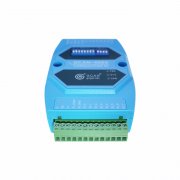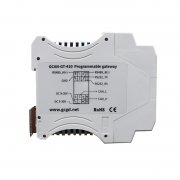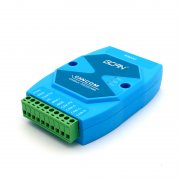Brief Introduction of CAN2.0B Frame Format
GCAN is a professional CAN-bus product manufacturer and service provider. We have wide variety of CAN bus products. Including USB-CAN, Ethernet-CAN, RS232/RS485-CAN, Modbus-CAN, UART-CAN, Bluetooth/wifi-CAN, Industrial CAN module, CANopen module and Service.
Than let's look at some knowledge about CAN, today is CAN2.0B.
CAN2.0B standard frame
CAN standard frame information is 11 bytes, including two parts: information and
data parts. The three bytes at the beginning are the information parts.
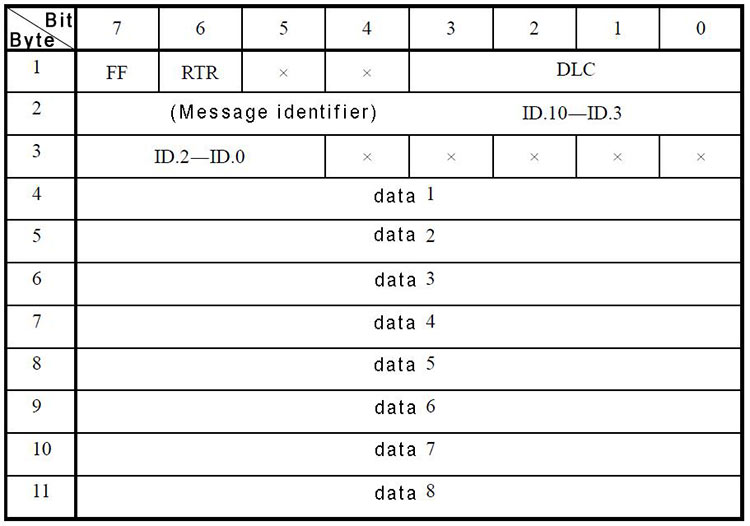
Byte 1: frame information
Bit7 (FF): frame format
FF=0: standard frame
FF=1: extend frame
Bit6 (RTR): type of frame
RTR=0: data frame
RTR=1: remote frame
Bit0~Bit3 (DLC): the actual data length in the data frame.
Byte 2~3: message id, 11bits are valid.
Byte 4~11 are the actual data of the data frame, remote frame (RTR=1) is invalid.
CAN2.0B extend frame
CAN extend frame information is 13 bytes, including two parts, information and data
parts. The five bytes at the beginning are the information parts.
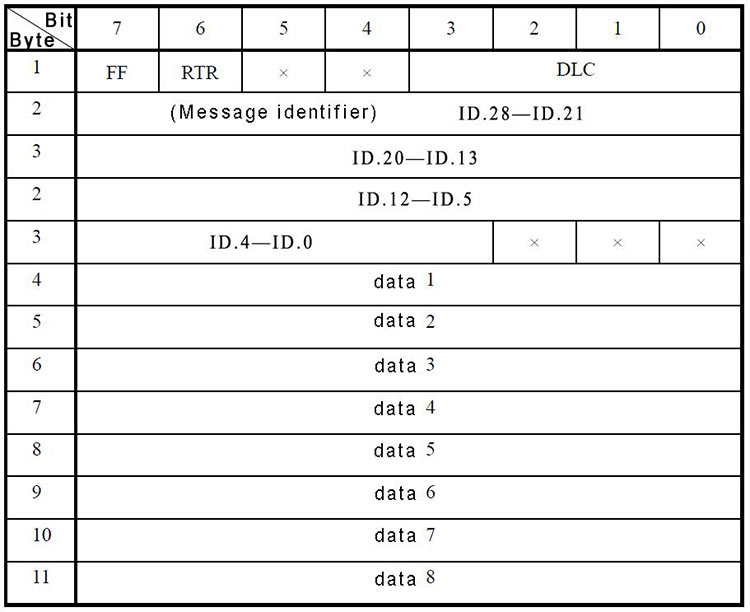
Byte 1: frame information
Bit 7 (FF): frame format
FF=0: standard frame
FF=1: extend frame
Bit6 (RTR): type of frame
RTR=0: data frame
RTR=1: remote frame
Bit0~Bit3 (DLC): the actual data length in the data frame.
Byte 2~5: message id, 29bits are valid.
Byte 6~13 are the actual data of the data frame, remote frame (RTR=1) is invalid.
GCAN are serious in doing CAN, also we have experienced R&D team. Welcome to discuss CAN with the Engineed all over the world.
Our Email/Skype: seven.gcan@gmail.com.
Tel: +86 17742765166
Than let's look at some knowledge about CAN, today is CAN2.0B.
CAN2.0B standard frame
CAN standard frame information is 11 bytes, including two parts: information and
data parts. The three bytes at the beginning are the information parts.

Byte 1: frame information
Bit7 (FF): frame format
FF=0: standard frame
FF=1: extend frame
Bit6 (RTR): type of frame
RTR=0: data frame
RTR=1: remote frame
Bit0~Bit3 (DLC): the actual data length in the data frame.
Byte 2~3: message id, 11bits are valid.
Byte 4~11 are the actual data of the data frame, remote frame (RTR=1) is invalid.
CAN2.0B extend frame
CAN extend frame information is 13 bytes, including two parts, information and data
parts. The five bytes at the beginning are the information parts.

Byte 1: frame information
Bit 7 (FF): frame format
FF=0: standard frame
FF=1: extend frame
Bit6 (RTR): type of frame
RTR=0: data frame
RTR=1: remote frame
Bit0~Bit3 (DLC): the actual data length in the data frame.
Byte 2~5: message id, 29bits are valid.
Byte 6~13 are the actual data of the data frame, remote frame (RTR=1) is invalid.
GCAN are serious in doing CAN, also we have experienced R&D team. Welcome to discuss CAN with the Engineed all over the world.
Our Email/Skype: seven.gcan@gmail.com.
Tel: +86 17742765166


